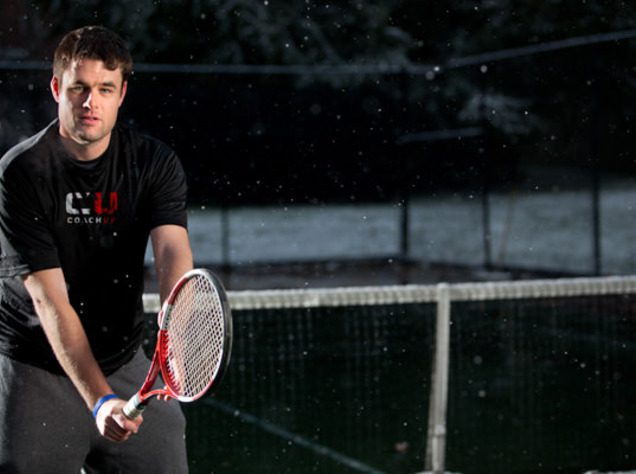While some professional athletes are successful in playing with a one-handed backhand, the two-handed backhand is most useful for beginners, high school, and collegiate tennis players. Frankly, it will give you a stability and strength that is just not possible with only one hand. In order to master the backhand groundstroke, tennis coaches focus on making sure their player has the proper grip, ready position, and ability to execute the shot. Take CoachUp’s certified tips with you the next time you hit the court and you’ll be thanking us later!

GRIP
In order to find the correct grip for a two-handed backhand, we’ll so humbly quote our piece on the types of popular tennis grips. We said: “This one will feature both of your hands in order to stabilize and launch a powerful return. You’ll want to use your dominant hand in a Continental Grip and your non-dominant hand above it in a Semi-Western Forehand Grip. So, for right-handed players, put your right hand at B2, and your left on B7 or B8, depending on what feels more comfortable.”
If you need more context or information, you can read the full article on grip types here.
With a two-handed backhand, your left arm is dominant in terms of giving power to the ball. The right arm is simply there to make sure you’re hitting the shot the way you’re hoping to. You shouldn’t have an extremely firm grip on the racquet, instead, keep your wrist loose enough so you can rotate your wrist but firm enough to give the ball power.
READY POSITION
Before you can execute your backhand from the center of the court, you need to get yourself in the proper position. Step out with your left foot and shuffle across the court, making sure you get to the ball early. Keep your knees bent, weight on the balls of your feet, and hold the racquet out in front of you. Line up your shoulder and hip facing the net, so when the ball comes you can turn your body and follow through. If the ball is coming across the court and is a high backhand, it’s important to use a drop step and crossover technique to your advantage.
EXECUTING THE SHOT
After you have the proper grip and the correct ready position down comfortably, all that’s left is the execution. The swing of the tennis racquet should move forward as you transfer your weight from your back foot to your front at about waist height. When the racquet starts to go back, bring it up a little and step in when you make contact.
Your left arm should be extended when you make contact, and your knees will most often be bent. Keep your head down to look at the ball and snap forward, catching the ball in front of you. After contact, bring your racquet across your body and follow through properly. Your swing should end by having a finish that is straight across the shoulder, allowing you to create strong force throughout the body. If you’re a beginner and are just learning to hit a backhand, it may be more useful to hit the ball with a low to high swing. *
(Related: Read about the approach and volley here.)
Huddle Up
The backhand is, ultimately, a crucial tool to have in your arsenal. In fact, it’s practically impossible to win a match without one. If you have no reliable backhand, an entire half of the court will cut off from your defense. Even if you have a manageable backhand, a good opponent will seek out any underlying weakness in an attempt to exploit them. So, without overstating it past the point of no return, it’s paramount to have a trusted and reliable backhand — only then will you be feared on the court!
However, if you’re still struggling with the backhand, then consider booking one of CoachUp’s private trainers to help you out with this difficult task. Our team has decades of experience with the backhand and they’re more than willing to bestow their advice and wisdom to you! What are you waiting for?
Be prepared for the biggest moments by mastering the small ones off the court.
How useful was this post?
Click on a star to rate it!
Average rating 0 / 5. Vote count: 0
No votes so far! Be the first to rate this post.




